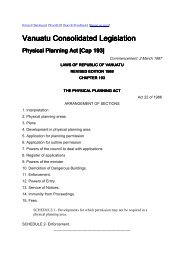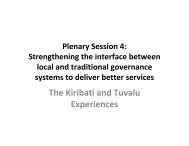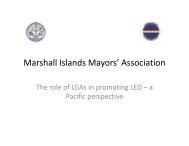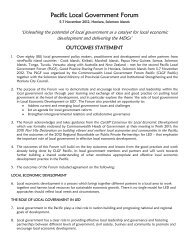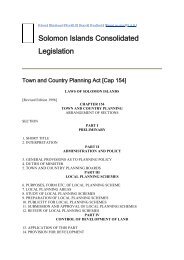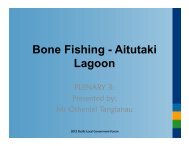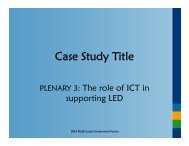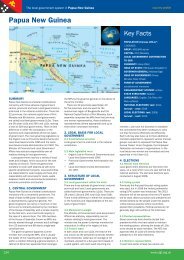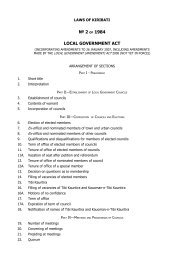Project Hetura Presentation.pdf - CLGF
Project Hetura Presentation.pdf - CLGF
Project Hetura Presentation.pdf - CLGF
You also want an ePaper? Increase the reach of your titles
YUMPU automatically turns print PDFs into web optimized ePapers that Google loves.
<strong>Project</strong> <strong>Hetura</strong><br />
Partnership between the National<br />
Capital District Commission and<br />
Townsville City Council
Townsville and Port Moresby - Sister Cities<br />
Port Moresby
Townsville
Port Moresby
Government in the National<br />
Capital District – Port Moresby<br />
• Port Moresby Local Government was established in 1971<br />
from 3 merged Local Government Councils<br />
• In 1975 Port Moresby was declared as Capital City of PNG<br />
• Interim NCD Government established in 1982 by act of<br />
Parliament.<br />
• Permanent government for NCD established in 1990.<br />
• Reforms in 1995 established a system of government for NCD<br />
(NCDC, MKC and 3 LLG’s)<br />
• 2001 Amendments removed LLG from the system and<br />
introduced appointed governments.<br />
• 2006 amendments re-introduced elected government for<br />
NCD.<br />
• 2007 – MKC is removed from NCD.
NCD Profile<br />
• Dual role – Territory Government for NCD and City<br />
Council of Port Moresby<br />
• Operates under NCDC Act<br />
• Powers to legislate and tax<br />
• 823 Employees (including casuals)<br />
• 11 Commissioners including Governor<br />
• NCD Building Board – Independent<br />
• NCDC Licensing Committee<br />
• NCD Physical Planning Board – Independent.
Port Moresby – Townsville<br />
Port Moresby<br />
Townsville<br />
Population 600,000 180,000<br />
Area<br />
Road Network<br />
399 km2 3,738 km2<br />
750 km 2,450 km<br />
Land Parcels 22,225 82,726<br />
Households/<br />
Res. PropertiesP<br />
37,221 64.750<br />
Unemployment 18.5% 4%<br />
Growth Rate<br />
3.2% (2.6% Qld)
<strong>Project</strong> <strong>Hetura</strong> Background<br />
• Sister City relationship between NCDC and TCC established in 1983<br />
• Scoping study commenced in 2000 to address:<br />
– Lack of capacity of NCDC to enforce legislation<br />
– Functions like physical planning and activities such as zoning, sub-<br />
division and development proposals were transferred from DOL to<br />
NCDC without corresponding skills transfer.<br />
– No segregation between forward planning and implementation of<br />
plans<br />
– General policy guidelines for city planning but no specific plan<br />
outcomes identified<br />
• <strong>Hetura</strong> commenced in 2002 to address complexities<br />
• Pilot project initially with emphasis on improving regulatory<br />
compliance. Structured for 4 years to 2006, extended to 2008 and<br />
now extended for a further 4 years.
Phase 1 – Modules and Objectives<br />
Phase 1 – 6 modules planned but primary focus<br />
on first 4<br />
1. Organisational (Departmental) Structure<br />
2. Policy Formulation<br />
3. Operational Procedures<br />
4. Information Technology<br />
5. Human Resources<br />
6. Financial Management and Corporate<br />
Information Systems
Phase 1 Outcomes - Organisational Structure<br />
• Strengthen Departmental Structure Regulatory<br />
Services<br />
– Reorganisation of structure and development of new<br />
positions and job descriptions<br />
– Development Control<br />
– Strategic Planning<br />
– Staff Training<br />
– Licensing<br />
– Enforcement – successful prosecutions<br />
– Admin – Customer Service and Records Mgt.<br />
This model was rolled out to the overall organisation and the<br />
restructure got approved in Sep 2010.
Phase 1 Outcomes – Policy Formulation<br />
Outcomes<br />
• Documents which provide frameworks for the future<br />
planned growth of the city and set priorities for<br />
infrastructure development in the City.<br />
Policies formulated and approved<br />
– NCD Urban Development Plan<br />
– Port Moresby Town Local Development Plan<br />
– NCD Settlements Strategy 2007-2011<br />
2011<br />
– Fencing Policy<br />
– Gordon’s s Special Development Control Policy<br />
– Liklik Stoa Policy<br />
– 8/9 Mile Local Area Plan and June Valley Pilot <strong>Project</strong>
Phase 1 Outcomes - Operational Procedures<br />
• Strengthened Strategic planning capabilities within NCDC.<br />
• Formulated written compliance processes<br />
• Devised separate applications for various permit categories<br />
including checklists.<br />
• Application processes continuously being monitored.<br />
• Pre-board meeting of applications<br />
• Establishment of front counter to enhance customer services<br />
• Central Records Management System in Place<br />
• Improved cooperation with the Revenue Department on debt<br />
recovery matters<br />
• To complement with the TARMIS-PPS
Phase 1 Outcomes - Information Technology<br />
• Cabling between Lakatoi Haus and Administration<br />
building<br />
• Standardisation of IT equipment<br />
• ITD to sign off on all IT procurements<br />
• End user agreement for IT equipment in place<br />
• Re-cabling of main city hall completed<br />
• Email and internet access to key staff<br />
• Set up of IT Steering Committee.<br />
• Investment by NCDC of around K1 million for IT<br />
equipment – Procurement of 5 services and related<br />
equipment
Phase 1 Outcomes - Financial Management and<br />
Corporate Information Systems<br />
• Developed a website for NCDC –<br />
www.ncdc.gov.pg – launched in October 2005<br />
– Provides information relating to the services we<br />
provide, permit application forms, fee structures,<br />
budget, planning documents, policy etc.<br />
• Developed Intranet<br />
• Financial Management to be carried to phase<br />
2
Further Outcomes<br />
• Experiences shared with other Councils in PNG<br />
• Frequent exchange visits between NCDC and TCC –<br />
Learning journey for both organisations<br />
• Improved Customer Service<br />
• Improvement to retention rates in Regulatory<br />
Services<br />
• Team approach to decisions via pre-board meetings<br />
• Quality advice to boards and committees.
Challenges Experienced in Phase 1<br />
• Overestimating what could be achieved<br />
• External disruptions to NCDC and TCC<br />
(particularly amalgamation)<br />
• Changeover of staff managing the project<br />
• Maintaining the momentum of the project<br />
going between visits
Lessons Learned from Phase 1<br />
• Communication is a vital element of the process and should<br />
be formally addressed throughout the second Phase of<br />
<strong>Project</strong> <strong>Hetura</strong><br />
• The primary focus of the first phase has been on two<br />
Departments within the organisation – Regulatory Services<br />
and Information Technology with solid results. Widening the<br />
focus within Phase 2 to include elements such as Human<br />
Resources and Corporate Governance will impact on the<br />
NCDC as a whole.<br />
• Delays are a part of the process and have impacted on the<br />
participation of both partners.<br />
• There is a valuable role for external trainers and other service<br />
providers. Developing relationships with people and<br />
organisations that can provide additional skills and services is<br />
advisable.
Phase 2 <strong>Project</strong> Management Team<br />
Pinio Kalus<br />
Angela Mageto<br />
Leonard Warisa<br />
Augustine Ravi<br />
NCDC<br />
(Team Leader) Finance and Corporate<br />
Regulatory Services<br />
Information Technology<br />
Financial Controller<br />
Susan Gheller<br />
Anthony Wilson<br />
Gavin Hammond<br />
TCC<br />
(Team Leader) HR and Planning<br />
Information Technology<br />
Regulatory Services
Phase 2 Planned Modules<br />
1. Information Technology<br />
– Governance<br />
• Security Management: virus management, incident management and fire f<br />
wall control systems<br />
• Backup systems and procedures<br />
• Business continuity planning<br />
• Documentation of Standards and Policies<br />
– Expand TARMIS to incorporate Permit Processing<br />
System
Phase 2 Planned Modules<br />
1. Information Technology (Con’t)<br />
– Records Management<br />
• Development of records management policy<br />
• Exploration of archiving requirements strategy and capacity<br />
– Case management system for legal services<br />
– Linking GIS to TARMIS<br />
• Link to revenue system<br />
• Property layer finalised<br />
• Finalisation of data collection (outsourced) and upload of information
Phase 2 Planned Modules<br />
2. Regulatory Services/Enforcement<br />
– Staff Training<br />
– Process review for efficiency<br />
– Centralisation of enforcement responsibilities and duties<br />
– Review of Structure of Enforcement Division and Finalisation of Structure<br />
3. Human Resources<br />
– Policy Development<br />
• Review of existing policies<br />
• Development of Code of Conduct Policy, Disciplinary Policy,<br />
Remuneration Policy<br />
• Development of Retention and Recruitment strategies<br />
– Recruitment and Retention<br />
– Review and Development of Organisational Development and Training<br />
program<br />
– Development of Cadetship/Studies Assistance Program<br />
– Corporately supported Reward and Recognition Program
Phase 2 Planned Modules<br />
4. Asset Management<br />
– Survey and identification of Assets and<br />
development of process to enter Road Assets in<br />
system<br />
5. Environmental Sustainability<br />
— Development of Environmentally Sustainable<br />
Building designs/codes<br />
6. Engineering – New Initiative
Phase 2 - Design of <strong>Project</strong> and<br />
Methodology<br />
DESIGN<br />
Two meetings between the NCDC and TCC<br />
management teams have developed the scope of the<br />
second phase and identified those areas from Phase<br />
1 still in need of attention.<br />
Participation in the scoping session by a number of<br />
operational staff throughout the NCDC was a<br />
positive that will contribute to “ownership” of the<br />
project throughout the organisation.
Methodology<br />
• Two annual visits by Management Team TCC<br />
• TCC Technical Officers exchange four times per year<br />
minimum for one to two week period.<br />
• Visits by selected NCDC Technical Officers for on the<br />
job exposure to TCC processes and mentoring by TCC<br />
staff.<br />
• Training needs analysis for NCDC followed by a<br />
review of external training resources which are<br />
available.<br />
• Development of KPI for project staff and evaluate<br />
performance.<br />
• Managing expectations
<strong>Project</strong> Forecast<br />
• There is a great deal of enthusiasm and<br />
support going into Phase 2 of <strong>Project</strong> <strong>Hetura</strong><br />
• Proposed structural change to the NCDC will<br />
provide an opportunity for TCC to assist with<br />
managing change.<br />
• The past and future success of the program<br />
can be attributed in large part to the<br />
professional approach and active support by<br />
the leadership team at the NCDC.<br />
• Proposed spin-off benefits to smaller towns<br />
and LLG’s



